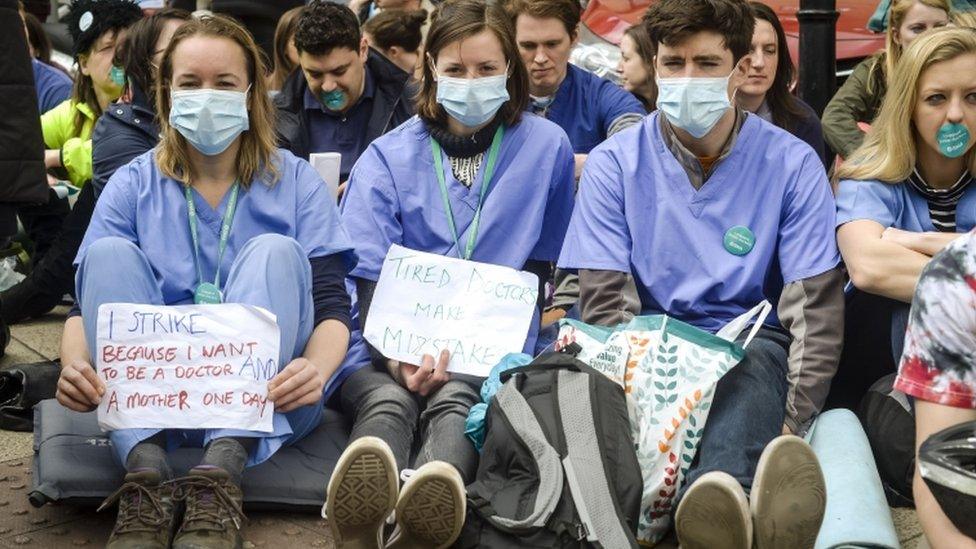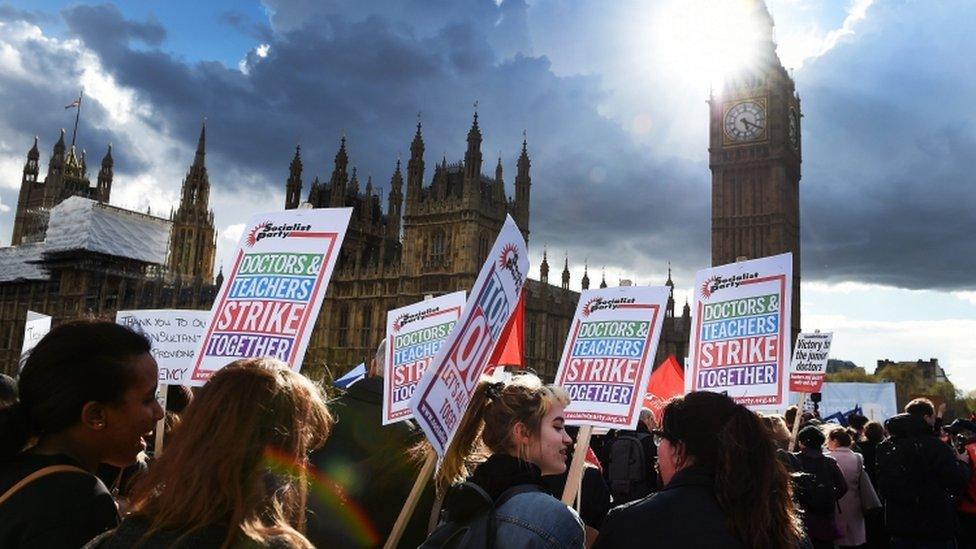Junior doctors' dispute: Proposal aimed at breaking deadlock
- Published

Talks over the controversial new junior doctors' contract broke down in February
A proposal aimed at breaking the deadlock in the junior doctors' dispute through fresh talks has been made by 22 medical colleges and faculties.
They want planning for the imposing of new junior doctors' contracts in England to be postponed for five days.
In return, the British Medical Association is asked to suspend for five days any new threats of strikes.
The BMA said it was prepared to agree, but the government said it was too late to suspend bringing the contracts in.
However, the "door remains open" for talks, the Department of Health said.
The colleges' joint statement, calling for what it calls a pause in the dispute so talks can resume, has been put out under the umbrella of the Academy of Medical Royal Colleges.
'Only way out'
Professor Dame Sue Bailey, its chairwoman, said: "A five-day pause without 'ifs, buts or maybes', and with both sides in the dispute publicly committing to a serious attempt to reach a resolution through genuine dialogue, is obviously the only way out of this impasse."
Talks over the controversial new contract broke down in February.
Health Secretary Jeremy Hunt accused the BMA of refusing to negotiate over Saturday pay and said he would press on with introducing the contract.
The BMA said there were wider unresolved issues over working hours and it was unfair to impose a contract rather than continuing discussions.
Between January and early April there were four strikes by junior doctors in England affecting routine but not urgent care.
'Action to escalate?'
Last week there were two one-day strikes affecting all forms of care, including emergencies - the first such action in the history of the NHS.
Consultants and senior nursing staff covered gaps caused by the walkouts and hospitals reported no problems with providing essential care.
The junior doctors' committee of the BMA is meeting on Saturday to discuss its next move, including the possibility of escalating the industrial action.
Until now there has been no prospect of further talks between the BMA and the government.

Last week there were two one-day strikes affecting all forms of care including emergencies
Dr Johann Malawana, BMA junior doctor committee chairman, said: "The government itself has admitted that there are serious, outstanding issues with the proposed contract.
"As such, the BMA would be prepared to agree to this proposal and temporarily suspend industrial action so that talks can resume with a mutually agreed facilitator, if the government is also prepared to suspend the threat of imposition."
Labour accused the health secretary of acting in an irresponsible manner.
A Department of Health spokesperson said: "It is now too late to change the process of bringing in contracts which is well under way throughout the country.
"However, the door remains open to talk about implementation and many other non-contractual issues of concern to junior doctors - so if this intervention helps those talks to go ahead, we welcome that."

The junior doctors' committee of the BMA is meeting on Saturday to discuss its next move
The academy statement was backed by the NHS Confederation, which represents leading health organisations.
Rob Webster, its chief executive, said: "We welcome the academy's proposal to create a safe space for a conversation between the parties about how we find a way out of this dispute.
"Both sides should give serious consideration to an approach that would find support from across managerial and clinical leaders."
General Medical Council chairman Professor Terence Stephenson said: "We would support any initiative that sought to bring both sides together to resolve the issues before putting patients at further risk of harm."
- Published27 April 2016
- Published6 April 2016

- Published1 December 2015
